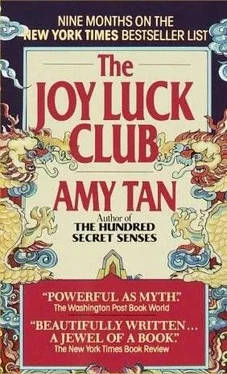Our rooms are next to each other and are identical. The rugs, drapes, bedspreads are all in shades of taupe. There's a color television with remote-control panels built into the lamp table between the two twin beds. The bathroom has marble walls and floors. I find a built-in wet bar with a small refrigerator stocked with Heineken beer, Coke Classic, and Seven-Up, mini-bottles of Johnnie Walker Red, Bacardi rum, and Smirnoff vodka, and packets of M amp; M's, honey-roasted cashews, and Cadbury chocolate bars. And again I say out loud, "This is communist China?"
My father comes into my room. "They decided we should just stay here and visit," he says, shrugging his shoulders. "They say, Less trouble that way. More time to talk."
"What about dinner?" I ask. I have been envisioning my first real Chinese feast for many days already, a big banquet with one of those soups steaming out of a carved winter melon, chicken wrapped in clay, Peking duck, the works.
My father walks over and picks up a room service book next to a Travel amp; Leisure magazine. He flips through the pages quickly and then points to the menu. "This is what they want," says my father.
So it's decided. We are going to dine tonight in our rooms, with our family, sharing hamburgers, french fries, and apple pie ŕ la mode.
Aiyi and her family are browsing the shops while we clean up. After a hot ride on the train, I'm eager for a shower and cooler clothes.
The hotel has provided little packets of shampoo which, upon opening, I discover is the consistency and color of hoisin sauce. This is more like it, I think. This is China. And I rub some in my damp hair.
Standing in the shower, I realize this is the first time I've been by myself in what seems like days. But instead of feeling relieved, I feel forlorn. I think about what my mother said, about activating my genes and becoming Chinese. And I wonder what she meant.
Right after my mother died, I asked myself a lot of things, things that couldn't be answered, to force myself to grieve more. It seemed as if I wanted to sustain my grief, to assure myself that I had cared deeply enough.
But now I ask the questions mostly because I want to know the answers. What was that pork stuff she used to make that had the texture of sawdust? What were the names of the uncles who died in Shanghai? What had she dreamt all these years about her other daughters? All the times when she got mad at me, was she really thinking about them? Did she wish I were they? Did she regret that I wasn't?
At one o'clock in the morning, I awake to tapping sounds on the window. I must have dozed off and now I feel my body uncramping itself. I'm sitting on the floor, leaning against one of the twin beds. Lili is lying next to me. The others are asleep, too, sprawled out on the beds and floor. Aiyi is seated at a little table, looking very sleepy. And my father is staring out the window, tapping his fingers on the glass. The last time I listened my father was telling Aiyi about his life since he last saw her. How he had gone to Yenching University, later got a post with a newspaper in Chungking, met my mother there, a young widow. How they later fled together to Shanghai to try to find my mother's family house, but there was nothing there. And then they traveled eventually to Canton and then to Hong Kong, then Haiphong and finally to San Francisco…
"Suyuan didn't tell me she was trying all these years to find her daughters," he is now saying in a quiet voice. "Naturally, I did not discuss her daughters with her. I thought she was ashamed she had left them behind."
"Where did she leave them?" asks Aiyi. "How were they found?"
I am wide awake now. Although I have heard parts of this story from my mother's friends.
"It happened when the Japanese took over Kweilin," says my father.
"Japanese in Kweilin?" says Aiyi. "That was never the case. Couldn't be. The Japanese never came to Kweilin."
"Yes, that is what the newspapers reported. I know this because I was working for the news bureau at the time. The Kuomintang often told us what we could say and could not say. But we knew the Japanese had come into Kwangsi Province. We had sources who told us how they had captured the Wuchang-Canton railway. How they were coming overland, making very fast progress, marching toward the provincial capital."
Aiyi looks astonished. "If people did not know this, how could Suyuan know the Japanese were coming?"
"An officer of the Kuomintang secretly warned her," explains my father. "Suyuan's husband also was an officer and everybody knew that officers and their families would be the first to be killed. So she gathered a few possessions and, in the middle of the night, she picked up her daughters and fled on foot. The babies were not even one year old."
"How could she give up those babies!" sighs Aiyi. "Twin girls. We have never had such luck in our family." And then she yawns again.
"What were they named?" she asks. I listen carefully. I had been planning on using just the familiar "Sister" to address them both. But now I want to know how to pronounce their names.
"They have their father's surname, Wang," says my father. "And their given names are Chwun Yu and Chwun Hwa."
"What do the names mean?" I ask.
"Ah." My father draws imaginary characters on the window. "One means 'Spring Rain,' the other 'Spring Flower,' " he explains in English, "because they born in the spring, and of course rain come before flower, same order these girls are born. Your mother like a poet, don't you think?"
I nod my head. I see Aiyi nod her head forward, too. But it falls forward and stays there. She is breathing deeply, noisily. She is asleep.
"And what does Ma's name mean?" I whisper.
" 'Suyuan,' " he says, writing more invisible characters on the glass. "The way she write it in Chinese, it mean 'Long-Cherished Wish.' Quite a fancy name, not so ordinary like flower name. See this first character, it mean something like 'Forever Never Forgotten.' But there is another way to write 'Suyuan.' Sound exactly the same, but the meaning is opposite." His finger creates the brushstrokes of another character. "The first part look the same: 'Never Forgotten.' But the last part add to first part make the whole word mean 'Long-Held Grudge.' Your mother get angry with me, I tell her her name should be Grudge."
My father is looking at me, moist-eyed. "See, I pretty clever, too, hah?"
I nod, wishing I could find some way to comfort him. "And what about my name," I ask, "what does 'Jing-mei' mean?"
"Your name also special," he says. I wonder if any name in Chinese is not something special. "'Jing' like excellent jing . Not just good, it's something pure, essential, the best quality. Jing is good leftover stuff when you take impurities out of something like gold, or rice, or salt. So what is left-just pure essence. And 'Mei,' this is common mei , as in meimei , 'younger sister.' "
I think about this. My mother's long-cherished wish. Me, the younger sister who was supposed to be the essence of the others. I feed myself with the old grief, wondering how disappointed my mother must have been. Tiny Aiyi stirs suddenly, her head rolls and then falls back, her mouth opens as if to answer my question. She grunts in her sleep, tucking her body more closely into the chair.
"So why did she abandon those babies on the road?" I need to know, because now I feel abandoned too.
"Long time I wondered this myself," says my father. "But then I read that letter from her daughters in Shanghai now, and I talk to Auntie Lindo, all the others. And then I knew. No shame in what she done. None."
"What happened?"
"Your mother running away-" begins my father.
"No, tell me in Chinese," I interrupt. "Really, I can understand."
Читать дальше












